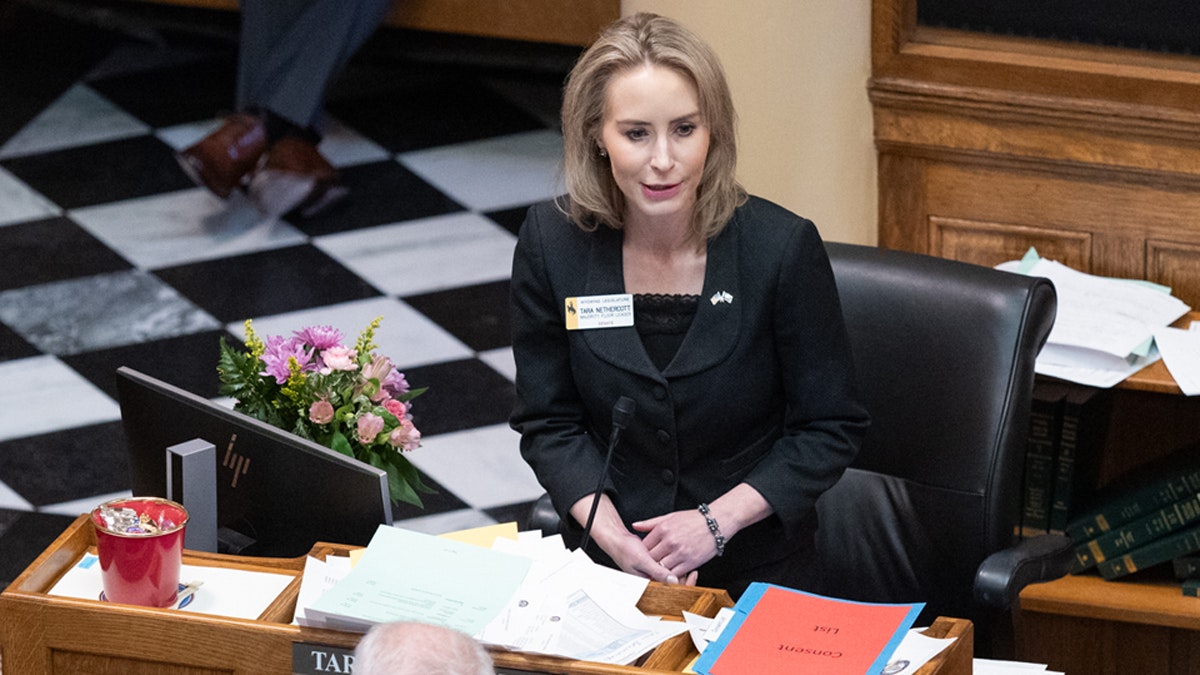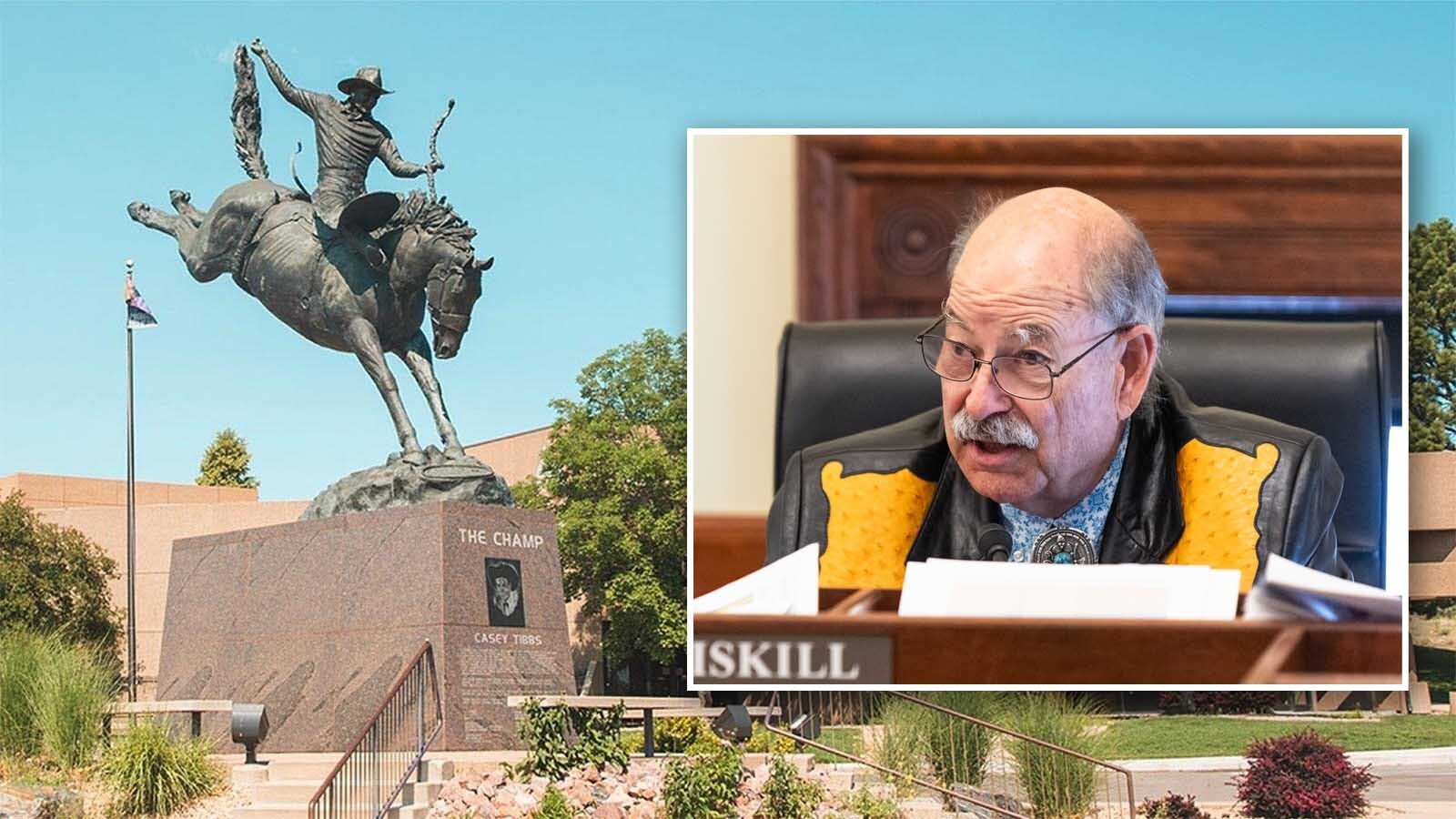Neighbors of a proposed cellphone tower site in the Ranchettes area north of Cheyenne are accusing Laramie County commissioners of choosing special interests over people after the commission approved plans to build a 150-foot cell tower there.
The approval came after several strenuous objections from neighbors, who raised health and safety issues, citing recent statements by U.S. Health and Human Services Secretary Robert F. Kennedy, Jr.
Commissioners approved the plans two weeks ago from Rocky Mountain Towers for a monopole tower that can accommodate up to four carriers in the neighborhood.
Kennedy has suggested that cellphones can produce electromagnetic radiation that can do neurological damage to children who are around them all day, as well as cause cellular damage or even cancer.
His critics, meanwhile, have pointed out that so far there’s been no widespread increase in the rate of brain tumors, despite the widespread use of cellphones.
That lack of evidence of harm also has been noted by the National Cancer Institute and Food and Drug Administration, both federal agencies that Kennedy now oversees.
Chris Roth, who is among those in the neighborhood speaking out against the cellphone tower, said he believes the health questions alone should warrant a second look at the matter.
He said a petition of area residents shows people living there don’t want it.
“It’s just disgusting that at the time of the hearing, there were 68 signatures voting against this and only one family who wants it,” Roth told Cowboy State Daily. “So, 68-1.”
Aside from the health concerns, there were also many speaking against the project from the standpoint of property values, suggesting that a tower doesn’t really belong in a housing development.
Joseph Perry said the studies he’s looked at show up to a 21% reduction to property values when a cellphone tower is within 0.72 kilometers of a home.
“The concept of needing more, I’m sure it’s right,” he said. “It’s a growing industry. Of course they want more. I understand that.
“But understanding the impacts to the people within the local communities is extremely important.”
Growing Area Has Needed Additional Service For Years
Verizon would be the initial tenant for the proposed cellphone tower, according to Rocky Mountain Towers owner Shelly Neace, who told commissioners during June 17 hearing that it will dramatically improve cellphone service in that area.
“Verizon has been looking in this area for several years, two to three years that I know of,” she said. “So, a number of people have been contacted.”
Construction the monopole with capacity for up to four carries ensures it won’t be necessary to put up additional towers if other carriers come along, she added.
To select a site, Rocky Mountain Towers sent out multiple letters to all potential landlords in the area whose property’s zoning complied with having a tower on it, until finding one who was willing.
Neace said she’s never been to a hearing where people didn’t raise the same objections related to health and property damages.
“(Health) studies have been done once and for all, and we’ve done them over and over and over again,” she said.
She also said that so far, no studies have shown a direct connection to an increased incidence of cancer.
“Yet the public still has concern,” Neace said. “I respect that. I respect that we have fears.”
But, she added, cellphone towers emit what’s known as nonionizing radiation, which means it doesn’t have enough energy to remove any electrons from any atoms or molecules like DNA. That’s the general mechanism for radiation-caused cancer.
“Nonionizing radiation is a baby’s monitor,” she said. “It’s the remote control that you use for your television. You use this wireless technology every day that’s non-ionizing.”
The tower, being 150 feet tall, will keep the emitting components in the airand not near anyone, she said. The amount of radiation at ground level is considerably less than that high up in the air. Those living in the neighborhood are further shielded by their own homes, in addition to their distance from the tower.
“We are regulated so heavily by the FCC that we operate at 10,000 times below the maximum allowable exposure limits,” Neace said. “So, while I want to address this respectfully, again, there are lots of reports out on this.
“I’m sure you can go to your Internet, and you can find a negative report on anything, but I’ve done my homework over the years. This is a situation where health is simply not an issue. It’s not been proven to be an issue.”
Federal Law Limits County’s Options
County commission member Ty Zwonitzer told Cowboy State Daily that five or six people have tried to appeal the county’s approval of the cellphone tower, and that the county has received a lot of correspondence about it.
Zwonitzer said the county plans to respond to each letter, but is awaiting further information from Rocky Mountain Towers on a couple of key points.
“We want to get them all the information,” he said.
Zwonitzer said he sympathizes with the residents and somewhat agrees that their neighborhood isn’t the best place for a cellphone tower.
“The exact same thing happened to me,” he said. “We moved into our house and two months later, I get a good old wireless broadband — Visionary tower — about 1,000 feet and it’s directly out my front door.
“So, I get to stare at it every day. So, my heart and sympathy go out to them.”
But, Zwonitzer added, there are federal statutes that tie the county commission’s hands when it comes to voting against the tower.
The federal code spells out that state and local governments cannot regulate placement or construction or modification of wireless service facilities on the basis of environmental effects of radio frequency conditions, Zwonitzer said. So essentially, all of the health issues raised by constituents cannot impact the county’s decision.
“That’s straight from the FCC,” Zwonitzer said. “The federal government has severely limited the local government in what it can consider to denya site plan for cellphone towers.
“So, granted, evidence was submitted, and we reviewed it, but we’re forced to basically ignore any of the radio frequency studies that people gave us.”
Conflicting Studies
Zwonitzer added that when he looked up studies on cellphone towers and health, he found lots of information that conflicts with what was presented during the public hearing.
“I feel like I’m doing the same Google search that they do, but I get a completely different answer,” he said. “So, I’m not saying they were lying in their correspondence, but everyone pretty much says, ‘Hey, we’re not sure, more research needs to be done.”
The other rationale that county commissioners can use to reject a cellphone tower would be a broker’s opinion on the market impact from a specific cellphone tower on a specific property.
“It really requires more than just showing us studies they found on the internet,” Zwonitzer said. “It takes cold, hard facts, and ultimately, a lot of the research that I did says the only property that is essentially monetarily affected by the cellphone tower is the one that it’s on.
“And, in some instances, it actually brings more value to the land and surrounding area, kind of depending on where you are.”
Denying the tower on the basis of what was presented to the commissionwould have led to litigation with the FCC, Zwonitzer said. That would be extremely costly for the county on an issue where the law is already pretty clearly not in the county’s favor.
“A lot of people are under the impression that we have a say in the location of this thing, and we essentially have zero say,” he said.
Aside from that, Zwonitzer also has questions about denying the tower when it comes to individual property rights.
“It’s no different than saying like, ‘Hey, I think your barn could be in a better location, and I don’t want to see it,” Zwonitzer said. “‘So yeah, my heart goes out to them, but at the same time, the will of the majority does not trump the rights of the minority.”
American Cancer Society Suggests More Study Needed
The American Cancer Society has so far not taken an official position on whether cellphone towers cause cancer.
It says that so far, there’s been no strong evidence that exposure to radio frequency waves from cellphone towers causes any noticeable health effects.
“This does not mean that (radio frequency) waves from cellphone towers have been proven to be absolutely safe,” the American Cancer Society says in a report about the issue. “Most expert organizations agree that more research is needed to help clarify this, especially for any possible long-term effects.”
With the head of Health and Human Services expressing concerns about cellphones and cellphone towers, more study might well be in the offing.
After that, it would still take an act of Congress to change existing laws so that county commissions could reject cellphone towers on that basis. Right now, the law has prohibited it, Zwonitzer said.
Kennedy has praised cellphone restrictions in schools, citing health impacts. Nine states so far have enacted bans on their use in classrooms, and 15 states have introduced similar legislation.
On the flip side of the coin, Laramie County Commissioner Linda Heath said cellphones are lifesaving devices because they allow people to call for help in an emergency. That is ultimately what swayed her vote.
“The thing that really sticks out to me is the improvement of coverage of the area north and to the west from this cell tower,” she said during the commission meeting. “I am the liaison to the fire chiefs, and I have sat on the combined communications advisory board and one of the things we continually hear is that we don’t have coverage here.”
Often, emergency responders are seeking to use their cellphones for GPS coordinates or other devices like iPads that can help guide them to someone who is in trouble, she said.
“I look at that I-25 corridor and we’re seeing more and more traffic up there. We’re seeing more and more accidents up there,” she said. “Not only do I see a benefit for the residents and those who are traveling up in that area for this additional coverage from the cell tower, I see it for our emergency responders as well.”
Response times are critical to health outcomes, she added.
“Statistics will show that if you have a stroke or heart attack, the longer you wait to get medical help and get to a hospital, your chances of recovery rapidly decrease,” she said. “I live out east, and if I have an issue like that, I really want my first responders to be able to find me rapidly and get me to the hospital where I can get assistance.
“We’ve seen increased traffic accidents up there, particularly with semis, and somebody’s got to be able to get a hold of dispatch so we can get our responders out there,” she said. “So, I am going to be in favor of this site plan. I see this as a huge public safety benefit for our responders and for the county.”
Renée Jean can be reached at renee@cowboystatedaily.com.





